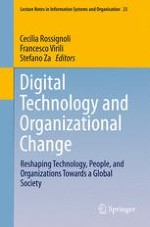2018 | OriginalPaper | Buchkapitel
E-learning Effectiveness from a Students’ Perspective: An Empirical Study
verfasst von : Leonardo Caporarello, Beatrice Manzoni, Martina Bigi
Erschienen in: Digital Technology and Organizational Change
Aktivieren Sie unsere intelligente Suche, um passende Fachinhalte oder Patente zu finden.
Wählen Sie Textabschnitte aus um mit Künstlicher Intelligenz passenden Patente zu finden. powered by
Markieren Sie Textabschnitte, um KI-gestützt weitere passende Inhalte zu finden. powered by
